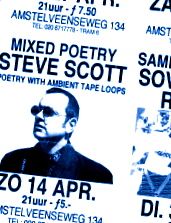|
|
 |
“The traveler sees what he sees; the tripper what he has come to see.” -G.K. Chesterton. From
the time British poet/ musician/ filmmaker Steve Scott arrived at St.
Marks in the Bowery with a plastic bag full of poems, he has been
playing havoc with the three Ps of poetry, prose, and performance,
combining them in new and startling ways. A
graduate of Croydon College of Art, he has written and performed widely
in the UK, where his multimedia film, Correspondences, was selected for
London’s “Expanded Cinema” festival.
|
Stateside, he's best known for his mid- '80s rock record, Love in the Western World, on the indie Exit label. Appearing without fanfare, this auspicious debut floored fans and sent usually verbose critics searching for superlatives. Steven Soles of the Alpha Band was the producer, with the post-punk 77s fueling Scott's literate mix of humor and insight, exactly on target for the era's new-wave sensibilities. For "This Sad Music", the album's showpiece, Scott juxtaposed a televangelist with a newscast of dying whales, intoning the resulting lyrical collision over the 77s' minimal soundbed. |
 |
 |
His next foray found him reciting poetry over tape loops of ambient music on The Butterfly Effect. The album’s twelve minute plus opus, “No Memory of You” came courtesy of The Boundaries, Scott’s ongoing series of travelog/ poetry journals which have continued to spill back and forth between print and performance. Empty Orchestra, the literal meaning of “Karaoke”, was an instrumental CD, with lyrics printed inside so that the listener could be “Steve Scott for a day” by reading along to the music. Scott returned to museum installations in the late ‘90s to stage Crossing the Boundaries, a traveling exhibit with painter Gaylen Stewart which toured worldwide from the US to China. He currently heads CANA, an international arts group which has held conferences in Asia and Eastern Europe, from Bali to Bulgaria. He writes and lectures often on the arts in the US and UK, and is the author of two books, Crying for a Vision and Other Essays, and Like a House on Fire: Renewal of the Arts in a Postmodern Culture. He holds an M.A. in Global Leadership. |
  |
 |
As
I write, The Boundaries
circulate somewhere in small-run chapbooks. Tapes and CDs of his
various projects, shrapnel from legendary indie labels, have scattered
to the four winds.
Scott’s continuing creativity and penchant to experiment have inspired
more than one artist to leave the mainstream and make a hard left for
parts unknown. His seemingly inexhaustible gift for renewing burnt out
artists has led some to see him as a patron saint for a Lost
Generation. But the last word may belong to Peter Banks of UK band,
After the Fire: “A uniquely gifted musical poet? One thing you cannot
do with Steve Scott is categorise him.”
|
Crying
for a Vision and Other Essays
|
|
|
cryingforavision
Contents: Introduction: A Horse of a Hundred Colors Part One: Crying for a Vision: Are You Responsible for This Monstrosity? The Act of Seeing With One's Own Eyes How Can You Use Something That Leaks? Nothing More Than Dirt? Freedom, Power, and Creativity Living Sacrifice/ Transformed Mind Where Language Ends? Towards a Lost Wax Mind Only a Beginning Part Two: Scratching the Surface: The Light By Which We See Crossing the Boundaries Fear and Multicultural Trembling When Worlds Collide: The Novels of Shusaku Endo Part Three: Work in Progress: Emotional Tourist: An Interview with Steve Scott Crying for a Vision Study Guide Endnotes |
|
|